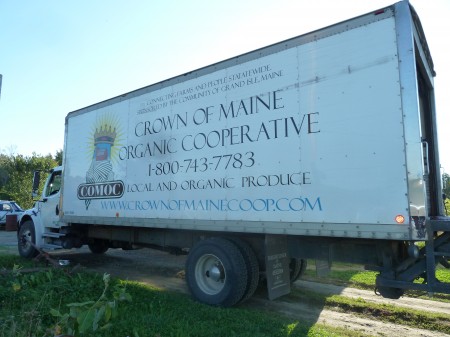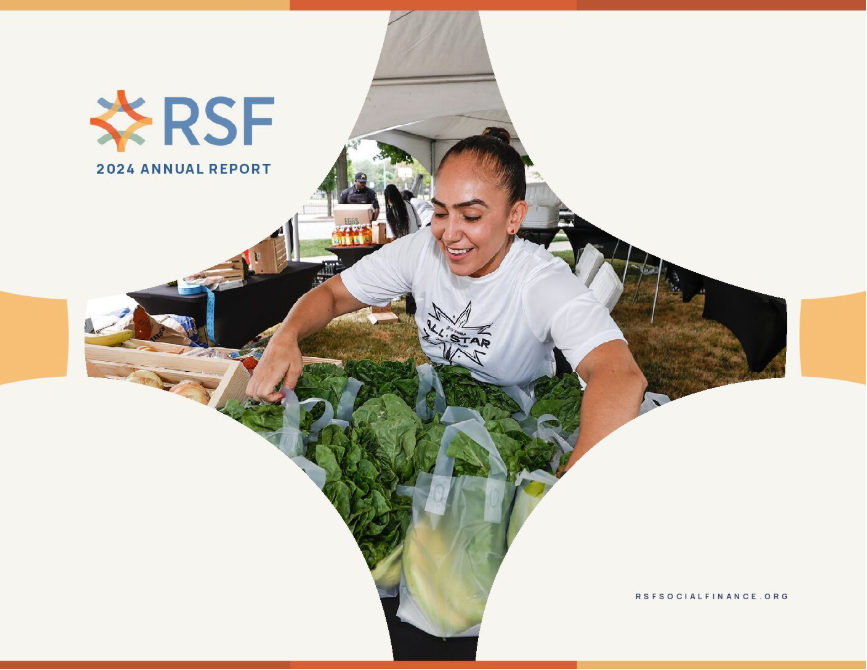Marada and Leah Cook were raised with their three other siblings on a 380-acre family farm in remote Aroostook County in northern Maine. In 1994, at the end of the family’s first year of farming, their 2.5 acres of potatoes yielded far more than a family of 7 could ever hope (or want) to consume. With no local markets in the immediate area, their parents, Jim and Kate Cook, took the seats out of the 15-seater family van, affectionately named “Big Red,” and went out in the greater community to generate interest in the fruits of their first harvest. The response was overwhelming and a business was born: Crown O’ Maine Organic Cooperative. The family began driving products from six different family farms to Southern Maine and Boston and developing a market for fresh local foods.

Maine’s small family farms have struggled for decades due to insufficient financing options, a small and geographically dispersed population, and eroding farm infrastructure. Crown O’ Maine is tackling some of these challenges by addressing two critical needs of the local farmers: distribution and marketing.
When Jim Cook passed away in 2008, Marada and Leah took over Crown O’ Maine. All of Jim’s hard work in building a market, ensuring quality products, and increasing the number of suppliers left the company well-positioned to address the increasing demand for local, fresh, and organic produce. Their father started with six local farms servicing a few buyers. They have since relocated to central Maine and, as the leading marketer and distributor of fruits and vegetables, now work with over 150 local, small-scale family farms to bring healthy, fresh food to communities throughout Maine and several other New England locations. Crown O’ Maine acts as the transportation system (they pick-up directly from farmers), marketers (they represent each farm and are not co-branded under one label), and distributors (they handle sales to 62 independent retailers, 2 Whole Foods stores, 40 restaurants, 38 buying clubs, 7 institutions, 5 farm stands, and 8 CSA Farms).
When asked how they stay competitive, Marada said that while the big agriculture companies have personnel, trucks, efficiency, sales, and reliable distribution, they lack a real connection to the food, farmers, or land. That’s a truly sad statement but not off the mark. In contrast, Crown O’ Maine has an alliance with every farmer in their network. Rarely pushing farmers on price, they assist with organizing cooperative purchasing for farm inputs; educate non-organic farmers on the advantages of transitioning their farms; and help farmers get products market-ready for distribution to retailers. Crown O’ Maine connects farmers with local markets, and consumers with their local farmers.
Crown O’Maine works with over 60 small scale vegetable farmers, many organically certified farms. They support dozens of value-added food producers, such as Heiwa Tofu, who produces tofu from Maine grown organic soybeans, and Spring Break, who produces maple syrup and raw honey. Their commitment to sustainable livestock production supports 10 pasture-based beef, poultry, lamb, and goat producers. Though Maine is a tough climate for many types of fruit, Crown O’Maine buys from two raspberry farms, three strawberry farms, 4 blueberry producers, and two apple orchards that have preserved Maine varieties for over nine generations.
Local and fresh food can be expensive, partly because of the premium charged by additional distributors and retailers. One way Crown O’ Maine is holding down the cost of food distribution is through their buying clubs. The clubs allow community members to purchase as a group to access wholesale pricing. This requires more from the consumers–they must organize drop locations, handle internal accounting, and distribute the food among club members. But, Crown O’ Maine helps with this as well by offering a step-by-step buying club toolkit.
We at RSF believe that building a strong local economy starts with a healthy, local food system. We’re honored to have Crown O’ Maine as a borrower. We’d be delighted to see their model replicated a thousand times over and to see more companies adopt their values: always follow the path of what works for the consumer, the farmer, and the local economy. To us this is exemplary of an associative economy through which all the parties needs are met in the spirit of cooperation.
By Melinda Cheel
Melinda Cheel is former Manager of Partnerships & Communications at RSF Social Finance


